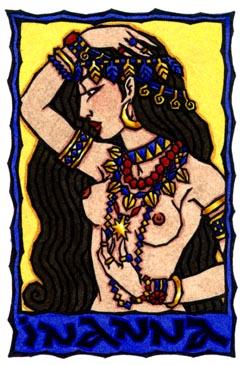
Part of my spiritual practice is to pay attention to the patterns that arise as I move through my life. The idea of community has been “up” for me for several months. My third year of the mystery school has been about learning how I am in community: what roles do I play? Where do I show up or fail to show up? How important do I believe my presence in the lives of others is? What defenses do I use to keep myself out of relationship? What role does community play in my larger life story? (I’m thinking of all those planets in the 11th house in my natal chart.)
Lately Pagan bloggers have been writing about community and place, and a friend has been writing me long emails about the concept of home. This morning, Garrison Keillor devoted The Writer's Almanac to Emily Dickinson, that poet who famously left home but rarely. He spoke about a time in Dickinson’s life when her community was disintegrating and she reached out, by letter, to Thomas Wentworth Higginson, asking him to be her mentor and friend. (It was clear from the way Keillor told the story that this guy had little appreciation for the kind of person who was reaching out to him, though their letters continued for the rest of her life. He didn’t like her poetry; he found her exhausting.)
As I pulled into work after dropping off Lugh at doggy daycare, I heard a song on the radio, a song that took on meaning for me first when I was 16 and my family moved from Michigan – where I had friends and community and a sense of place, however flawed – to southern Ohio, which felt foreign and hostile to me: Pink Floyd, Wish You Were Here.
Did they get you to trade your heroes for ghosts?
Hot ashes for trees?
Hot air for a cool breeze?
Cold comfort for change?
How I wish you were here.
--I observe that Pagans as a people (the Pagani, as Sara Sutterfield Winn would say) attend to the question of community. Many of us practice as solitaries, and there’s the old joke that organizing Pagans is like herding cats. Many of us long for more, or better, community. We may chafe against the Pagan community we know. There are Witch Wars. Pagans get excluded from their communities. Our problems with building community – and I do think we have some serious problems with it – stem both from our novelty as a religious movement and our location within cultures like the U.S. where community is breaking down. We occupy a unique cultural moment in which community can’t be taken for granted as the place where you’re stuck and the people you’re stuck with. Community needs to be built intentionally – and I think that’s a good thing – but I also think that most of us don’t know how to do that.
When we talk about community-building in a general way, we’re probably talking about building relationships with people. But as Pagans, we also care about building relationships with the land and its inhabitants (material and immaterial). Feeling connected to the land is important to many of us, and many of our other values emerge from that feeling - or the desire for a feeling - of connection to the land.
Hecate writes about a connection between pacifism, the Land, and having a sense of place.
Kim Antieau writes about her longing for community and how freakin’ hard it is to build community. She expresses a bewilderment that I often feel.
Molly has made connection with her land and its inhabitants central to her life, and she seems to have a knack for building community.
Updates: Sara adds her giddy voice to the brew. Executive Pagan talks about choosing to be a local.
(The photo is of the entrance to the gorge four blocks from my house.)




3 comments:
Hey, I can play "Wish You Were Here" on the guitar! (Granted, on a six-string not a twelve-string, which is how it's played on the album, but still.)
I heard a story on NPR a number of months ago in which a commentator was describing a survey that they've been doing for more than 50 years, where they ask respondents how happy they are--the percentage of people who say they are happy has been in steady decline since sometime in the 50s. The commentator said that the line on the graph perfectly parallels responses to another question: "how many close friends do you have?" Americans have half as many close friends now as they did in the 50s, and half as many of us say we are happy. I know it's not perfectly conclusive, but it's convincing to me.
Thank you for the beautiful essay. You have given me a lot to think about :-)
Sia
http://fullcirclenews.blogspot.com/
I have often posted on a lack of personal community and the lack of Pagan community.
A friend of mine was telling me that he read somewhere the United States has no culture of its own because we are a mish-mash of a variety of cultures. Due to this lack of "national culture" we lack the meaningful communities our ancestors had in their native lands.
I read something similar a few years back, but damned if I can remember the name of the book. Basically, in the United States, if one stays in their hometown, they care considered a failure. Because of the pioneering legacy, one must cut themselves off from everyone they know and move away to create new contacts. By doing so, we cut off important parts of our culture.
Wonderful topic. I look forward to seeing more on it.
Post a Comment